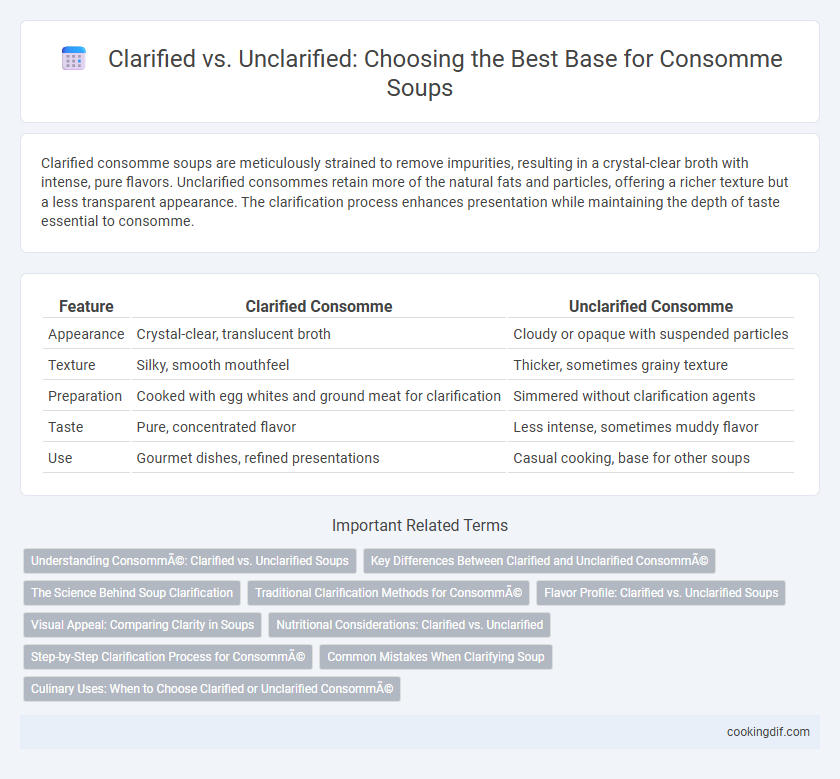Clarified consomme soups are meticulously strained to remove impurities, resulting in a crystal-clear broth with intense, pure flavors. Unclarified consommes retain more of the natural fats and particles, offering a richer texture but a less transparent appearance. The clarification process enhances presentation while maintaining the depth of taste essential to consomme.
Table of Comparison
| Feature | Clarified Consomme | Unclarified Consomme |
|---|---|---|
| Appearance | Crystal-clear, translucent broth | Cloudy or opaque with suspended particles |
| Texture | Silky, smooth mouthfeel | Thicker, sometimes grainy texture |
| Preparation | Cooked with egg whites and ground meat for clarification | Simmered without clarification agents |
| Taste | Pure, concentrated flavor | Less intense, sometimes muddy flavor |
| Use | Gourmet dishes, refined presentations | Casual cooking, base for other soups |
Understanding Consommé: Clarified vs. Unclarified Soups
Consomme is a type of clear broth achieved through a clarification process that removes impurities and fat, resulting in a transparent, intensely flavored soup. Clarified consomme uses egg whites and ground meat to trap particles, enhancing visual appeal and purity, while unclarified versions retain suspended particles and fats, offering a more rustic, opaque appearance. Understanding these differences is crucial for chefs aiming to balance presentation and texture in classic French cuisine.
Key Differences Between Clarified and Unclarified Consommé
Clarified consomme is meticulously prepared through a process of simmering ground meat, egg whites, and vegetables to create a clear, flavorful broth free of impurities, while unclarified consomme retains sediments and appears cloudy. The key difference lies in clarity and purity, with clarified consomme prized for its crystal-clear presentation and refined taste, whereas unclarified versions emphasize robust, unfiltered flavor profiles. Texture also varies; clarified consomme is smooth and light, contrasting with the richer, denser mouthfeel of unclarified consomme.
The Science Behind Soup Clarification
Clarified consomme achieves its crystal-clear appearance through a precise process of straining and using egg whites to coagulate impurities, which trap particles and fat as they cook. This scientific method enhances both the visual appeal and the purity of flavor by removing suspended solids and excess oils. Unclarified soups retain these particles, resulting in a cloudier broth with a more robust, hearty profile but less refined texture.
Traditional Clarification Methods for Consommé
Traditional clarification methods for consomme rely on an egg white raft, which traps impurities and fat as the soup simmers, resulting in a crystal-clear broth. This process involves whisking egg whites with ground meat, mirepoix, and acid, then gently simmering to coagulate the mixture and filter the consomme. Compared to unclarified broths, clarified consommes exhibit a refined appearance and intensified flavor, highlighting the importance of this time-honored technique in classic French cuisine.
Flavor Profile: Clarified vs. Unclarified Soups
Clarified consomme offers a clean, intense flavor as impurities and fats are removed, resulting in a pure and concentrated broth that highlights the essence of the ingredients. Unclarified soups retain more fats and solids, delivering a richer, fuller body with complex, layered flavors and a heartier mouthfeel. The choice between clarified and unclarified consomme significantly influences the soup's depth, texture, and presentation.
Visual Appeal: Comparing Clarity in Soups
Clarified consomme soups exhibit a crystal-clear appearance, achieved through meticulous straining and removal of impurities, enhancing visual appeal and sophistication on the plate. Unclarified soups, by contrast, retain suspended particles and fats, resulting in a cloudy or opaque look that may appear rustic but lacks the refined transparency. Clear consomme soups are prized in culinary presentations for their elegant sheen and ability to showcase garnishes distinctly within the broth.
Nutritional Considerations: Clarified vs. Unclarified
Clarified consomme soup offers a lower fat content and reduced calories due to the removal of impurities and fat during the clarification process, making it a healthier choice for those monitoring their dietary intake. Unclarified consomme retains more proteins, minerals, and potential nutrients but may also contain higher levels of fat and particulate matter, which can impact digestion and caloric density. Nutritional considerations should include the purpose of the consumption, with clarified consomme favoring light, easily digestible meals, while unclarified versions provide a richer nutrient profile for energy and satiety.
Step-by-Step Clarification Process for Consommé
Consomme requires a precise clarification process involving the use of egg whites, ground meat, mirepoix, and acidic components like tomato or lemon juice to create a raft that traps impurities during simmering. Careful gentle simmering allows the raft to coagulate and rise, filtering the broth and leaving a crystal-clear consomme beneath. Straining through fine cheesecloth or a coffee filter ensures the removal of residual solids, resulting in a perfectly clarified consomme with deep, concentrated flavor and pristine appearance.
Common Mistakes When Clarifying Soup
Common mistakes when clarifying consomme soup include using excessive heat, which causes proteins to coagulate too quickly and trap impurities inefficiently. Skipping gradual temperature control results in cloudy broth, as the raft fails to form a tight seal to strain out solids effectively. Overstirring during clarification disrupts the raft, introducing particles back into the liquid and reducing the soup's clarity.
Culinary Uses: When to Choose Clarified or Unclarified Consommé
Clarified consomme, prized for its crystal-clear appearance and refined flavor, is ideal for elegant presentations and delicate dishes where visual appeal and purity of taste are paramount. Unclarified consomme, with its richer texture and deeper flavor, suits heartier recipes such as stews or as a base for robust sauces that benefit from its full-bodied essence. Culinary professionals choose clarified consomme for haute cuisine and formal dining, while unclarified options support rustic, comforting meals that emphasize depth over clarity.
Clarified vs Unclarified for consommé soups Infographic

 cookingdif.com
cookingdif.com